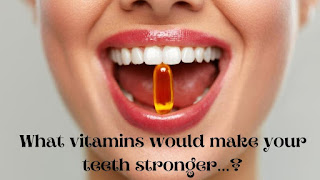What vitamins would make your teeth stronger…?
Flossing and brushing are
important in maintaining a good oral hygiene, but did you know that the
nutrient supplements that you consume can also have a great impact on your oral
health? This blog will helps you to know about the best vitamins
for teeth and gums and also helps for what foods you can eat to add more of
these nutrients to your daily diet. Surprisingly, many of the foods are
delicious and natural.
The following
vitamins that you can consume in your daily routine:
1. Calcium: cause
As we already
know that the calcium is good for your bones and it’s also good for your teeth.
Its helps to maintain a healthy body and teeth. Dairy products like milk and
yogurt have a type of calcium that’s easy for your body to consume. Canned
salmon and sardines are also good products. If you do not absorb meat or dairy,
or want to add more calcium vegetables to your diet, try collards, brocooli,
kale, mustard greens, turnip greens, and book Choy . Keep in mind that to
protect the calcium stays in these foods, cook them in a small amount of water
for a short time, like scalding or griddle, instead of boiling. Additionally,
you can also take calcium as an additive.
2. Phosphorus:
Phosphorous is
another important vitamin for healthy teeth. Phosphorus helps the body swallow
and use calcium and bolster teeth
by protecting and fix the tooth enamel. If you’re looking to add more Venus to
your diet, try to absorb milk, meat, and whole grains. Fortuitously, most
people get enough of this vitamin in their regular diet without the need for additive.
3. Vitamin D:
Vitamin
D plays an important role in maintaining your teeth healthy. Absorbing vitamin
D is easy via additives. It’s also instant in oily fish like salmon, mackerel,
and herring. Also, a few foods are vitamin D fortified, like milk and breakfast
cereals.
4. Vitamin C:
Vitamin C
isn’t just good for your teeth; it’s also good vitamin for gums. Vitamin C
helps keep the conjoining tissues in your gums healthy and strong, which clutch
your teeth in place—which means failure can lead to bleeding gums and gum
disease. Further, vitamin C additives also removed erosive tooth wear in early
childhood. You’re likely grasping a lot of vitamin C in your diet. Additives are
also universally available.
5.
Vitamin A:
Vitamin A
isn’t just good for your eyes and skin; but it’s also good for your mouth, especially
your saliva production. Saliva helps to split the food and also cleans bacteria
from in between your teeth. You can also get Vitamin A in orange-collared
fruits and vegetables like sweet potatoes, carrots, egg yolks, plus fish and
bell peppers. It’s also available as additives.




Comments
Post a Comment